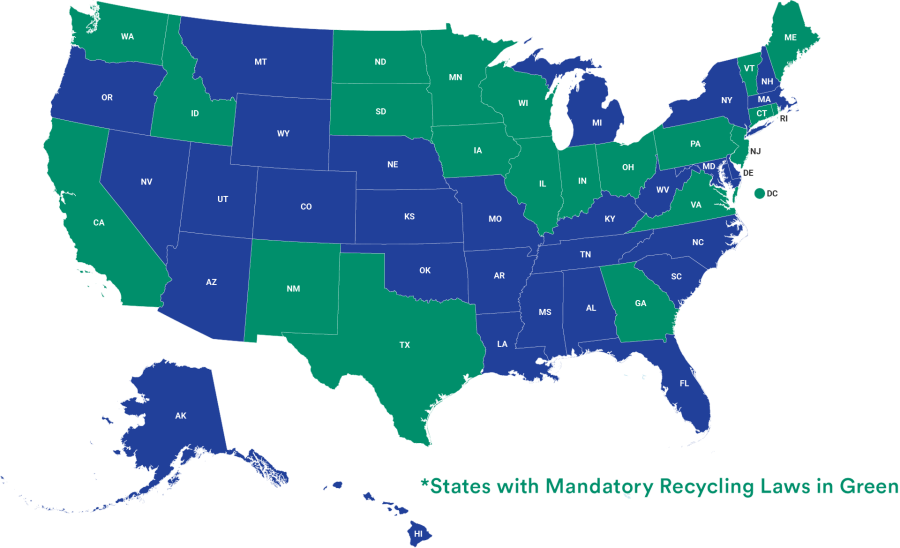What Are The Recycling Laws In The USA
The recycling laws of the USA are not very strict, but there are some things that are specifically discouraged from being recycled.
The one thing that people don’t usually think about recycling is batteries. When it comes to batteries, it’s important to know what kind of battery it is. You shouldn’t recycle even batteries that are the same kind, they might have different metals in them or they might be coated.
Batteries in general should be recycled but they go through a different process than regular recycling. While most batteries have their own recycling program, other common examples of what should not be recycled are thermostats, fluorescent light bulbs, car batteries, mercury-containing devices, medicine, or any kind of old paint.
What Happens When There Aren’t Any Recycling Laws
Some people are not that familiar with US recycling laws or how they work.
If you want to know why recycling is important, there are a few reasons why. The first one is that raw materials are becoming increasingly more expensive, making it more expensive for companies to make products. This means prices will go up and consumers will have to spend more money.
Waste products can also become a burden on the environment and can pollute the water and soil, unless they are properly sent to the landfill with a dumpster rental. At the end of it, the environment will suffer the most. The better way to solve all these problems is to recycle the products and use dumpster rental services to discard waste better.
The Recycling Laws Of The USA And How It Affects Your Business
Recycling laws in the USA require all businesses to follow certain rules. For example, businesses must provide each of their customers with a recycling bin. The recycling bin must also be clearly visible to all customers.
If the business doesn’t comply with these rules, they can be charged a fee of up to one thousand dollars. It’s a good idea to comply with the law, because who really wants to pay that much? Besides, if a company helps in keeping the environment as clean as possible, there will be more customers interested in buying the company’s products and will help the company.
How To Deal With Recycling Laws
Recycling is a great way to help the environment, but it can be quite the hassle. There are so many different types of materials that can be recycled! Some of the most common materials include: glass, newspaper, metal, and plastic.
Knowing what can be recycled is a big help. Just because something is recyclable through your city’s recycling program doesn’t mean that it is recyclable nationwide. Sometimes, you will still have to throw away certain recyclables because they simply cannot be recycled. The best way to deal with recycling laws is to check what is recyclable in your area and then abide by the rules.
What To Do When You Have A Recycling Crisis
We all encounter a recycling crisis at some point in our lives. The most common crisis would be when you leave in the morning with a recyclable, and come back in the evening to find that it has been thrown in the trash. The worst part is that there’s no one to blame for the crisis because no one is to blame, and it’s not anyone’s fault.
You just have to face the fact that there is a recycling crisis, and that you’ll have to deal with it on your own. That’s why, before your recycling crisis takes place, you need to prepare yourself, so that you don’t panic when it’s time.
Common Problems Faced By Recyclers
The recycling process is a costly and not always easy one even if you use dumpster rentals. Many times, recyclers will make mistakes that can lead to certain issues, including omitting to ask a dumpster rental company to help them with their recycling needs. For example, if you are not sorting your recyclable materials properly, that can lead to contamination with other metals and reduce the quality of your bales.
Contamination can be one of the most common issues plaguing recyclers, from the sorting process to the end product. When bales are contaminated, they are not as valuable and not as many people are interested in buying them. If you recycle below a certain purity level, it’s not even worth the trouble of shipping and selling. You need to be meticulous when it comes to sorting your recycling and deliver only the best quality materials to your drop-off center.
How To Deal With Recycling Laws
Most cities/municipalities have recycling laws, but they vary. Most require that recyclable items be separated from the non-recyclable items and placed in different receptacles and not sent to the landfills within a dumpster rental.
You can find out what is recyclable and what is not by looking at the label of most items or by looking it up online. Bigger items like furniture, appliances and carpeting are usually not recyclable. Be sure to follow all the rules for your area to avoid fines and extra work.










